
 |
|
The Butterfly Effect (2004) Cast: Ashton Kutcher, Amy Smart, Elden Henson, Melora Walters, William Lee Scott, John Patrick Amedori, Irene Gorovaia, Jesse James, Kevin Schmidt, Ethan Suplee, Eric Stoltz, Logan Lerman, Sarah Widdows, Cameron Bright, Jesse Hutch, Daniel Spink, Grant Thompson, Brandy Heidrick, John B. Lowe, Callum Keith Rennie 2004 – 113 minutes Rated: Reviewed by Dustin Putman, January 24, 2004.  January can be a discouraging month for cinema, a period following the late-year awards season when studios dump their most commercially problematic and creatively bankrupt efforts. Almost every year, however, one movie seems to sneak in that refuses to abide by this notion. In 1999, it was "In Dreams." In 2001, it was "The Pledge." In 2002, it was "Orange County." Newly joining this exclusive list is "The Butterfly Effect," an applause-worthy, wildly ambitious mind-bender that is not only one of the more original motion pictures to be released in recent months, but also one of its most emotionally unshakable.
January can be a discouraging month for cinema, a period following the late-year awards season when studios dump their most commercially problematic and creatively bankrupt efforts. Almost every year, however, one movie seems to sneak in that refuses to abide by this notion. In 1999, it was "In Dreams." In 2001, it was "The Pledge." In 2002, it was "Orange County." Newly joining this exclusive list is "The Butterfly Effect," an applause-worthy, wildly ambitious mind-bender that is not only one of the more original motion pictures to be released in recent months, but also one of its most emotionally unshakable.
 The title derives from a chaos theory that states a butterfly flapping its wings in South Africa can cause a typhoon on the other side of the world, and the film in question asks if the same concept may be possible through time rather than space. Evan Treborn (Ashton Kutcher) is a college psychology major who, as a kid, suffered from a series of blackouts during key moments of emotional distress. After a long-estranged childhood friend, Kayleigh Miller (Amy Smart), commits suicide, Evan discovers that, when reading events in his journals, he has the unique ability to travel back in time to when these things occurred and change them. Soon, he becomes obsessed with saving Kayleigh's life, a feat that proves more difficult than expected as their pasts and futures, as well as that of pal Lenny (Elden Henson) and Kayleigh's unhinged brother, Tommy (William Lee Scott), careen progressively out of control.
The title derives from a chaos theory that states a butterfly flapping its wings in South Africa can cause a typhoon on the other side of the world, and the film in question asks if the same concept may be possible through time rather than space. Evan Treborn (Ashton Kutcher) is a college psychology major who, as a kid, suffered from a series of blackouts during key moments of emotional distress. After a long-estranged childhood friend, Kayleigh Miller (Amy Smart), commits suicide, Evan discovers that, when reading events in his journals, he has the unique ability to travel back in time to when these things occurred and change them. Soon, he becomes obsessed with saving Kayleigh's life, a feat that proves more difficult than expected as their pasts and futures, as well as that of pal Lenny (Elden Henson) and Kayleigh's unhinged brother, Tommy (William Lee Scott), careen progressively out of control.
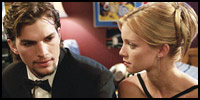 Written and directed by J. Mackye Gruber and Eric Bress (who scripted 2003's "Final Destination 2"), "The Butterfly Effect" is a masterfully disturbing and eerie thriller, but, as a refreshing conceit, most of its effectiveness evolves from its thought-provoking ideas, as opposed to cheap shock value and exploitation. It is also a love story between Evan and Kayleigh, gentle and true, but one that seems destined for a tragic outcome. As a time-traveling fantasy, it somewhat reminds one of a grimmer version of "Back to the Future" without ever feeling like a rehash. The picture moves effortlessly between the past and present with startling aplomb and an increasing sense of poignancy, as pieces of Evan's childhood only come into focus after he is able to return to them as an adult. Out of the changes he makes, however, the characters' present day evolution sometimes has unexpected and horrific ramifications.
Written and directed by J. Mackye Gruber and Eric Bress (who scripted 2003's "Final Destination 2"), "The Butterfly Effect" is a masterfully disturbing and eerie thriller, but, as a refreshing conceit, most of its effectiveness evolves from its thought-provoking ideas, as opposed to cheap shock value and exploitation. It is also a love story between Evan and Kayleigh, gentle and true, but one that seems destined for a tragic outcome. As a time-traveling fantasy, it somewhat reminds one of a grimmer version of "Back to the Future" without ever feeling like a rehash. The picture moves effortlessly between the past and present with startling aplomb and an increasing sense of poignancy, as pieces of Evan's childhood only come into focus after he is able to return to them as an adult. Out of the changes he makes, however, the characters' present day evolution sometimes has unexpected and horrific ramifications.
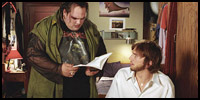 Perhaps the best thing about "The Butterfly Effect" is the intelligence brought to such a tricky premise. In the wrong hands, the plot could have easily become cheesy, preposterous, and even laughable. Auspicious debuting filmmakers Gruber and Bress refuse to fall into this trap at every corner, treating their characters and situations with maturity. We, as the viewer, are willing to swallow the many zigzagging developments—even when the vital issue of being able to go back in time is never fully explained—because Gruber and Bress do, bringing a passion and truth to the proceedings that is so seldom missing in most of today's movies.
Perhaps the best thing about "The Butterfly Effect" is the intelligence brought to such a tricky premise. In the wrong hands, the plot could have easily become cheesy, preposterous, and even laughable. Auspicious debuting filmmakers Gruber and Bress refuse to fall into this trap at every corner, treating their characters and situations with maturity. We, as the viewer, are willing to swallow the many zigzagging developments—even when the vital issue of being able to go back in time is never fully explained—because Gruber and Bress do, bringing a passion and truth to the proceedings that is so seldom missing in most of today's movies.
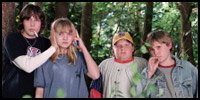 Recalling the tone and authenticity of 1986's "Stand by Me," the childhood sequences, detailing the dark events in the four friends' lives that forever shattered their bond and laid the path for their futures, are note-perfect. Touchy subjects, such as pedophilia, child molestation, animal cruelty, and a relatively harmless prank gone disastrously wrong, are treated with the utmost seriousness in a non-exploitive manner, as is its uncompromising portrait of adolescent rebellion, fear, and loyalty. The young actors, all of whom are dead ringers for their adult counterparts, buck the trend of unctuous child performers by turning in extraordinarily convincing work in what were clearly demanding roles. Especially impressive are John Patrick Amedori (2000's "Unbreakable"), Irene Gorovaia (2003's "It Runs in the Family"), and Jesse James (2001's "Pearl Harbor") as the 13-year-old Evan, Kayleigh, and Tommy.
Recalling the tone and authenticity of 1986's "Stand by Me," the childhood sequences, detailing the dark events in the four friends' lives that forever shattered their bond and laid the path for their futures, are note-perfect. Touchy subjects, such as pedophilia, child molestation, animal cruelty, and a relatively harmless prank gone disastrously wrong, are treated with the utmost seriousness in a non-exploitive manner, as is its uncompromising portrait of adolescent rebellion, fear, and loyalty. The young actors, all of whom are dead ringers for their adult counterparts, buck the trend of unctuous child performers by turning in extraordinarily convincing work in what were clearly demanding roles. Especially impressive are John Patrick Amedori (2000's "Unbreakable"), Irene Gorovaia (2003's "It Runs in the Family"), and Jesse James (2001's "Pearl Harbor") as the 13-year-old Evan, Kayleigh, and Tommy.
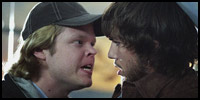 For Ashton Kutcher, who has come to be known as a comic actor on TV's "That 70's Show," and in 2000's "Dude, Where's My Car?" and 2003's "Just Married," this should be his breakthrough. As the adult Evan, Kutcher runs the gamut of emotions with dramatic intuition and weight. As Kayleigh, Amy Smart (2003's "The Battle of Shaker Heights") arguably has the trickier role. Her character goes through approximately five diverse incarnations, from a peppy sorority girl to a drug-addicted hooker to an emotionally scarred waitress, and Smart sharply imbues each one with enough dimension to keep them from becoming stereotypes. Evan and Kayleigh's relationship is the driving force that everything hinges on; were it not to come off genuine and worth caring about, the film would have collapsed. Fortunately, Kutcher and Smart are a charismatic couple, and the actors give their love story both weight and immediacy. Kudos, also, for the casting of wonderful character actors Melora Walters (1999's "Magnolia") and Eric Stoltz (2002's "The Rules of Attraction") in strong supporting roles as, respectively, Evan's caring, steadfast mother and Kayleigh's abusive, pedophiliac father.
For Ashton Kutcher, who has come to be known as a comic actor on TV's "That 70's Show," and in 2000's "Dude, Where's My Car?" and 2003's "Just Married," this should be his breakthrough. As the adult Evan, Kutcher runs the gamut of emotions with dramatic intuition and weight. As Kayleigh, Amy Smart (2003's "The Battle of Shaker Heights") arguably has the trickier role. Her character goes through approximately five diverse incarnations, from a peppy sorority girl to a drug-addicted hooker to an emotionally scarred waitress, and Smart sharply imbues each one with enough dimension to keep them from becoming stereotypes. Evan and Kayleigh's relationship is the driving force that everything hinges on; were it not to come off genuine and worth caring about, the film would have collapsed. Fortunately, Kutcher and Smart are a charismatic couple, and the actors give their love story both weight and immediacy. Kudos, also, for the casting of wonderful character actors Melora Walters (1999's "Magnolia") and Eric Stoltz (2002's "The Rules of Attraction") in strong supporting roles as, respectively, Evan's caring, steadfast mother and Kayleigh's abusive, pedophiliac father.
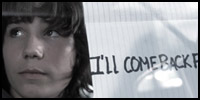 The central dilemma at work in "The Butterfly Effect" is whether, for better or worse, a person should let the natural hands of fate decide our outcomes, or change things with the chance that better lives could come of it. Directors J. Mackye Gruber and Eric Bress' solution to this matter is stunning in its conception and payoff. Instead of cheating the audience with an easy way out, they have come up with the only logical way for things to end. The final scenes, beautifully handled and acted, are bittersweet without falling victim to mawkishness and heartbreaking in their emphatic simplicity. "The Butterfly Effect" is the first great motion picture of 2004, and certain to be one of the best of the year.
The central dilemma at work in "The Butterfly Effect" is whether, for better or worse, a person should let the natural hands of fate decide our outcomes, or change things with the chance that better lives could come of it. Directors J. Mackye Gruber and Eric Bress' solution to this matter is stunning in its conception and payoff. Instead of cheating the audience with an easy way out, they have come up with the only logical way for things to end. The final scenes, beautifully handled and acted, are bittersweet without falling victim to mawkishness and heartbreaking in their emphatic simplicity. "The Butterfly Effect" is the first great motion picture of 2004, and certain to be one of the best of the year.
|
© 2004 by Dustin Putman |














